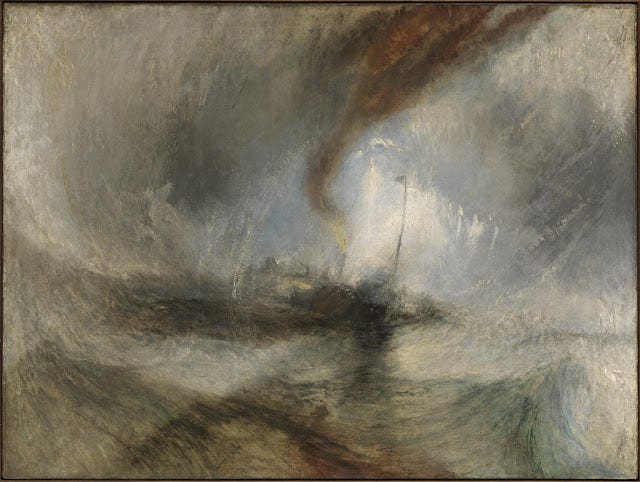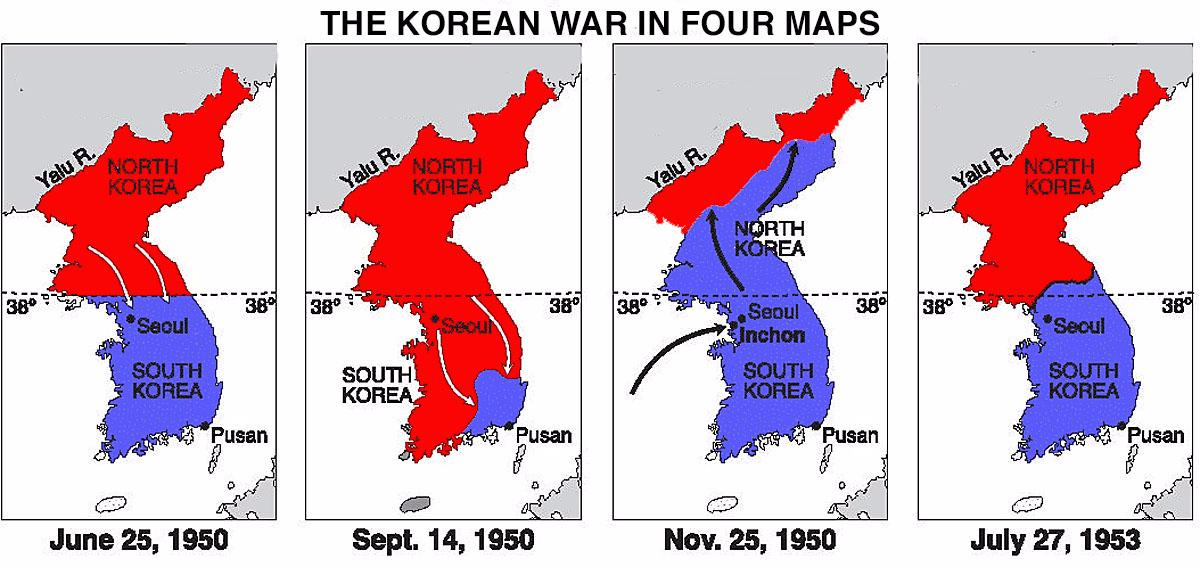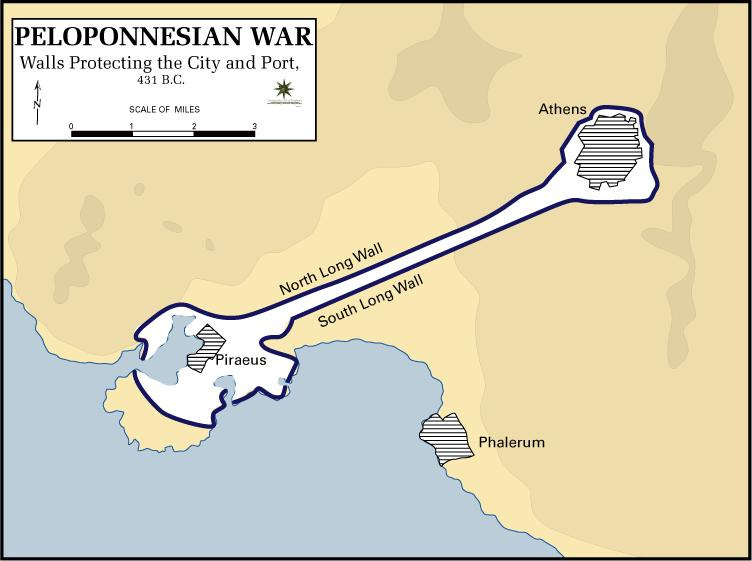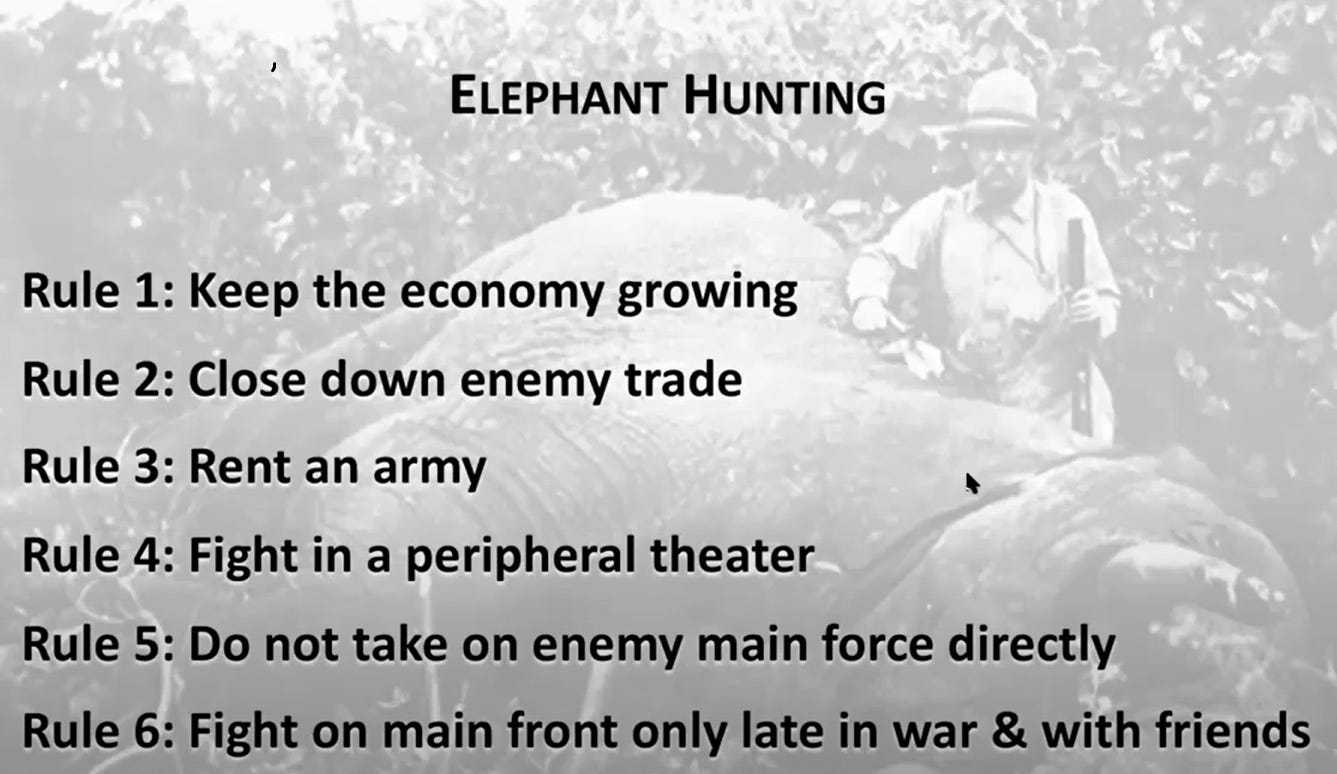Geopolitical Surf ‘n Turf
The Dialectics of Sea and Land Power--Grand Strategy for Global War 6
Last fall, commenting on the conflict in Ukraine, US Senator Lindsey Graham insisted, “I like the structural path we are on here. As long as we help Ukraine with the weapons they need and economic support, they will fight to the last person.”
This week U.S. Secretary of the Army Christine Wormuth remarked, “Our goal is to avoid fighting a land war in Asia,” Wormuth said. “I think the best way to avoid fighting that war is by showing China and countries in that region we can actually win that war.”
The land/sea power binary is a fundamental concept of geopolitical analysis and helps explain the strategic thinking behind these statements. Political entities, from Ancient Greece’s small city-states to today’s massive nation-states, have geopolitical “genders.” They are either primarily continental powers who fight with armies or are maritime powers who project naval power. Historically the great power struggles have been between land and sea powers: Ancient Egypt vs. Sea Peoples, Sparta vs. Athens, Rome vs. Carthage, Russia/Austria/Persia vs. Ottoman Empire, Papal Rome/France vs. Venice, France vs. the Dutch, and France/Germany vs. Britain. Today we see the China/Russia alliance of continental colossuses lining up to face off against the globe’s greatest maritime power ever—the United States—in a battle for global supremacy: Global War 6.
These “power-genders” are not absolute, the US certainly has an army and both Russia and China have substantial navies. But each nation’s geographic situation influences which side of the land/sea binary they fall on. This binary has a strong impact on a nation’s culture, economy and political outlook. Sea powers are democracies ruled by a commercial elites while land powers tend towards authoritarianism led by a landed aristocracies. Maritime culture is liberal, cosmopolitan and globalist while continental culture is authoritarian, parochial and nationalist. As Andrew Lambert in Seapower States observes:
Seapower still matters because the great fault lines of global politics consistently return to the contrasting nature of land and sea states. Contemporary tensions between the ‘West’, the liberal, democratic trading nations of the world, and their opponents – including Russia, China, North Korea and fundamentalist Islam – reflect deep cultural differences between continental systems of authoritarian rule, ideological conformity, command economies, closed borders and deep- rooted anxieties about the ocean as a vector for destabilising ideas that can be traced back to ancient philosophers and the seapower state legacy of inclusive politics, open, outward- looking societies, the rule of law, personal liberty and economic opportunity. That tension, between stasis and progress, closed minds and open seas, is the single greatest dynamic in human history (p. 329)
The archetypical geographic expression of a maritime society is an insular island. Although the US has a huge continental landmass, the US geopolitical position, seen from Eurasia, is that of a distant island that divides the vast Atlantic and Pacific oceans. As a virtual island, US faces no military threats from its borders. And so the US is a bit geopolitically “gender queer” when it comes to the land/sea binary. This queerness is expressed in the current US political divide. The endless Red-Blue kulturkampf fits snuggly within the sea/land cultural paradigm.
In terms of power projection, the prodigious capabilities and heritage of US Naval forces are beyond question. On the other hand, the US Army has never really shined. With the exception of Germany in WW2—a ground war the US entered late and faced a depleted army—the US Army has historically only defeated forces from technologically inferior peoples. The long Indian Wars and the Mexican-American Wars of the 19th century are examples. In the US Civil War, the North’s culture was maritime while the South’s was continental. It took the economically and demographically superior Northern armies four years to defeat the much smaller South. Land war did not come naturally to the democratic North, while the aristocratic South produced a number of brilliant army generals. In WW1, the US wisely entered the fray only in the final months of that vicious conflict. In the Korean War, after North Korea almost drove the South into the sea, the US army’s counteroffensive drove North Korean forces from the bottom of the peninsula all the way up to the Chinese border. But then Mao’s army, supported by Stalin’s air defence systems, pushed the US army back down to the 38th parallel. Vietnam was not a conventional war but the Army did not perform particularly well. The US Army performed well in Desert Storm but against an incompetent and backwards Iraqi army. In Iraq II and Afghanistan, the US ground forces were often just fighting primitive sheep herders and peasants.
One key strategic axiom of the land/sea binary is the way to topple a maritime global hegemon is to tempt them into an existential ground battle. Avoiding such a war is the thinking behind Senator Graham and Secretary Wormuth’s statements.
The Athens/Sparta conflict during the Peloponnesian War is the archetypical example of the land/sea binary and its impact on grand strategy. Coming into the war, Sparta with its hoplite army was the reigning Greek hegemon. The war was triggered by Sparta’s fear of Athens rising maritime empire which fuelled a powerful economy. A key strategic issue for each party was the choice of concentrating on what they do best or in trying to develop the opposing gender power. Should Athens only fight at sea and avoid land engagements? Or should Sparta develop a navy and defeat Athens in the open sea? Continental or maritime powers are not pure, they can be thought of on a spectrum with a roughly 80/20 split their preferred means of power: a typical maritime power is based 80% on their navy and 20 % on their armies. The ideal power alignment would be a 50-50 non-binary hybrid power. This is exceedingly difficult to achieve due to limited resources and cultural resistance to transitioning from one power gender to another. Arguably Ancient Rome and the Ottoman Empire are examples of hybrid land/sea powers.
The classic weakness of a maritime power is vulnerable land borders to hostile armies – which is why island nations make the best sea powers. Since sea powers are uncomfortable fighting land battles, the best way to topple a reigning maritime power is to force her into an existential land battle. Athens avoided this trap by building her impregnable Long Wall, which incorporated the city and her primary port. Sparta destroyed the surrounding farmland but Athens survived due to her ability to import food with her powerful commercial fleet.
As the Peloponnesian war progressed, Sparta developed a navy but was at first unable to achieve a decisive victory at sea. Athens ultimately lost the Peloponnesian War by sending an expeditionary force to Sicily and then being defeated in a both land and sea battle by Sparta and her allies at Syracuse. The war dragged on for nearly another decade but the die had been cast in Sicily for eventual Athens’ defeat.
Since the modern era dawned in 1500, all five global leaders have been maritime powers. But both Portugal and The Netherlands had long borders with neighbouring continental powers (Spain and France) which destabilized them to the point that global hegemony eventually shifted to the British Isles. During the Napoleonic Wars, Britain played her cards perfectly by avoiding existential land battles and instead built coalitions with proxy armies to wear down Napoleon’s armies. France attempted to become a hybrid land/sea power by building a world-class navy but cultural incongruities and insecurity on her continental borders never allowed this policy to fully come to fruition. Britain’s armies did engage in limited land battles on the periphery in Spain. But only after the Russians had defeated Napoleon, and he then escaped exile and gathered a small army, did Britain send an army to Belgium which along with Prussia and a Dutch army, defeated the ghost of Napoleon one last time. Waterloo was nothing but a footnote to the war but British subsequent British propaganda has glorified this British army victory.
This “information war” campaign may have backfired on the British because a century later during WW1, perhaps hopped up on Waterloo optimism, Britain made the fatal mistake of fighting an existential land war on the continent against the German menace. This war was economically devastating to Britain and was the beginning of her steep decline which was confirmed at the end of WW2 when the US took the reigns of global power.
Japan’s invasions of Manchuria in the 1930’s is another example of a maritime power foolishly getting stuck in a long continental war of attrition. It’s not clear if Japan would have defeated the US even if Japan had never entered China, but the task of fighting Chinese guerrilla armies certainly helped the US.
Someday, if the US loses Global War 6, the futile "War on Terror" may be seen in the same light as Athens’ Sicilian Expedition or Japan’s Manchurian invasions. Back in 2004, geopolitical wizard Zbigniew Brzezinski, cognisant of Russian weakness, encouraged the US to ignore the Middle East and to concentrate on grabbing the former Soviet Republics of Ukraine and Georgia. Instead the US wasted $8 trillion and 20 years underachieving in Iraq and Afghanistan.
S. C. M. Paine is a scholar specializing in Russia and China who teaches strategy at the US Naval War College. She refers to maritime powers as “whales” and land powers as “elephants.” She has a profound historical foundation but she eschews hard non-aligned analysis for a US-friendly narrative that idealizes sea powers and devalues of land powers. But her six rules for for maintaining maritime hegemony are very well informed. I have slightly edited these rules for “elephant hunting” during a Global War as follows:
1. Economic growth for you first and for your allies if possible.
2. Slow down your enemy’s economy through sanctions and/or naval blockades.
3. Use continental auxiliaries / proxies to fight your ground wars – ideally disgruntled neighbours of your enemy.
4. Engage your ground forces only in periphery theatres of war.
5. Never take on the main continental challenger alone.
6. Only enter your ground forces towards the end of a war against your main continental challenger and only once the outcome is clear and only when supported by allies.
With these rules in mind, let’s have a look at the US approach to Global War 6 so far.
Rule 1--Economic growth is more or less being maintained in the US but at the expense of Europe, who are being deindustrialized. Since effete Europe is bringing little-to-no defence capacity to the table, it does makes Machiavellian sense to impoverish them for the benefit of the US. Although France and Germany may grumble, they are so militarily weak that they have no alternatives in the short-term. Notice their non-reaction towards accusations the US blew up the Nord Stream pipelines.
Rule 2-- Sanctions are so far a failure, the Russian economy is responding stoically while Europe is getting hammered. If China is soon heavily sanctioned, there is a serious risk of blowback on the US economy, which would break rule Rule 1.
Rule 3--Fighting with money, not your own men, is the concept driving Senator Graham’s comments. So far, so good. The problem is what happens after fighting to the last Ukrainian? Send in the Poles? The US needs to quickly find another militant European people with a large population will to engage in trench warfare against massive Russian artillery attacks. And who will the US get to fight China? India?
Rule 4—Peripheral battles have not yet occurred but following an eventual Russian victory in Ukraine, the US may decide to invade Venezuela to secure oil resources. On the other hand, China-Russia may help Argentina take back the Falklands.
Rule 5--Today NATO does not provide enough assistance in taking on Russia, not to mention China. Most western European nations, even those with continental traditions, have adapted a culturally maritime attitude. A recurring problem for sea powers is their wealth culturally mutates into an effete, narcissistic society where martial virtues are lost. Note the recent Western Jihad on “toxic masculinity.” Moreover, NATO is now a protectorate--European nations have little control or interest in their own defence. Europe now sees defence as the job of the Americans. They realize that if America does not step in to protect Europe, they will lose so why waste money on defence? If America does step up then it will be America’s problem to save them. NATO has in the past been labelled an “empire by invitation” by Norwegian historian Geir Lundestad. NATO was certainly a viable fighting force during the Cold War but recently, in order to make Europeans dependent on them, the Americans have stripped most military potential from western Europe. Only in Eastern Europe is there are still lingering martial virtues left over from the Soviet days. What this means is that if Russia attacks NATO, the US must respond with her own ground troops since Europe is so militarily weak. This is not the position a maritime power wants to be in. The correct approach would be the US providing arms, logistics and intelligence support while it’s the Europeans who man the trenches. Even with the correct political will, which today is non-existent, it would take a decade to properly build up Europe’s military forces.
Rule 6—Avoiding a premature ground war will be difficult since there are not many proxies ready to fight Russia or China. In Global War 4 and 5 it was Russia/Soviet Union who played this role. The US dream scenario for retaining hegemony is a Russia-China war. Their nightmare scenario is the current Russia-China strategic alliance.
Russia and China are aware that the ideal way to defeat the US is to make them fight on at least two, or better yet, three, or even four fronts at the same time. A ground war in China, a ground war in Poland, a ground war in Iran, and a ground war in Korea would stretch US forces far past their breaking point. Even a two-front war in Asia and Europe would accomplish this.
Worse, the US military is struggling to find recruits. Low unemployment plays its role, but the current Red-Blue culture war is also having an impact. Given the continental culture of many Red state inhabitants, along with the idea that US imperialism spreads “cultural Marxism” around the globe, most young “toxic” males who in previous generations would have been strongly patriotic today see the United States government as their enemy and would actually prefer to fight for Putin instead of against him.
Just twenty years ago, the futile Iraq and Afghanistan adventures were supported by the right in the US. Today Ukraine is the latest cultural “current thing” (BLM, vax, pronouns, biological sex-denial) supported by the left. In a highly partisan environment, current-thing thinking creates its antithesis “blind contrarians” who automatically react against whatever the cultural elite are pushing. Coastal elites advocating sending boatloads of Red state males off to fight die against the Russians does seem like a win-win for team Blue no matter what the outcome of the war. This incoherence could be seen as a structural problem. On the other hand this arraignment makes perfect sense if the US wants to follow the Elephant Hunting Rules and avoid getting involved in a continental ground war with a primary challenger.
The current US strategy is to push her formidable information war capabilities to cover for the delicate geopolitical position the US finds itself in. Nicholas Burns, US ambassador to China recently declared, “the Chinese now understand, that the United States is staying in this [Asia-Pacific] region, we’re the leader in this region.”
Openly declaring yourself the alpha-dog Primal Father may feel good, but as former British Prime Minister Margret Thatcher once said, “Being powerful is like being a lady. If you have to tell people you are, you aren't.”








Something else to note which you touched on a bit too is that land powers tend to take major hits and go through big crises and huge devastation, yet despite that persist long-term if they are above a certain size (Sparta was too small). Russia, China and Iran are all still there, thousands of years later in the case of the latter two, and are serious powers, just as they have been historically
While maritime powers come and ago, and often fall apart.
>all five global leaders have been maritime powers
The notable thing here is that only one of them, the current leader, is a major power now. And even Britain wasn't saved by being an island.
Now it's hard to conceive a world in which the US is not a major power, it is just too big. But if it actually falls apart, who knows. The USSR did fall apart after all...
Your point on the durability of continental powers is a very important point. Sea power is ephemeral, featuring tiny overachievers (pre-US) while land power is permanent. What I am trying to build towards is an idea of hybrid powers, which is where both Russia-China and the US are heading. Russia-China will attempt to further develop their maritime potentials and the US may pullback at some point from global power to be a regional continental power. This type of sudden withdrawal of American power from the global order will certainly cause serious problems. It would create an interregnum crisis period which would be unpredictable and a bit dangerous for everyone.